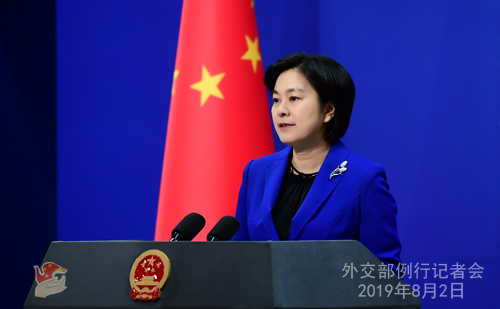
Foreign Ministry Spokesperson, Hua Chunying, gave a statement on the accusation against China being the main source of fentanyl-like substances in the U.S. at a regular press conference held on Friday.
The United States is the world's largest consumer market for narcotic drugs. The proliferation of fentanyl-like substances in the United States in recent years, which killed many people, is mainly linked to the country's tradition of abusing prescription painkillers.
Fentanyl-like drugs are subject to strict management and control in China and no fentanyl-like drugs produced by legal manufacturers have ever been found to flow into the United States.
BEIJING, Aug. 3 (Xinhua) -- The United States has groundlessly accused China of being the main source of fentanyl-like substances in the United States, blaming China for the U.S. fentanyl abuse crisis.
This is a complete distortion of facts and is totally unacceptable to the Chinese people.
The United States is the world's largest consumer market for narcotic drugs. The proliferation of fentanyl-like substances in the United States in recent years, which killed many people, is mainly linked to the country's tradition of abusing prescription painkillers.
The United States has only itself to blame for the fentanyl abuse crisis.
The accusation against China for being the main source of fentanyl-like substances is blatant slander.
Fentanyl-like drugs are subject to strict management and control in China and no fentanyl-like drugs produced by legal manufacturers have ever been found to flow into the United States.
Chinese law enforcement did crack cases of illegal processing or trafficking of fentanyl-like substances to the United States, but the number was very small. It is impossible for China to be a major source of fentanyl-like substances in the United States.
Fentanyl-like substances are under strict control in China. A total of 25 fentanyl analogues and two precursors have been put on China's list of controlled substances, more than those on the United Nations' list.
China began scheduling fentanyl-related substances on May 1. The international community including the U.S. Drug Enforcement Administration (DEA) commended the move.
Since the scheduling took effect, China has made unprecedented efforts in addressing the fentanyl issue, in terms of issuing laws and regulations, conducting an overall market inspection, and stepping up police investigation.
Progress has been made. According to data provided by the DEA, only four cases of fentanyl-like substance trafficking from China were reported by the U.S. Customs and Border Protection in the second quarter of this year.
This indicates that the flow of fentanyl-like substances to the United States from China, which was already low, has significantly declined.
However, death caused by fentanyl abuse in the United States remains high. Thus, it is unreasonable to blame China for the fentanyl issue in the United States.
The Chinese nation has in history suffered deeply from the harm of narcotic drugs. The Chinese government always attaches great importance to drug control, maintaining a "zero tolerance" stance toward the drug issue. Remarkable progress has been achieved in China's fight against drugs.
In view of the increasingly rampant abuse of new drugs such as fentanyl around the world, the Chinese government has promptly announced the scheduling measures and taken actions even if no sign of significant fentanyl-like substance abuse has emerged in China.
This reflects the Chinese government's firm stance against drugs, demonstrating its sense of responsibility to advance global drug control.
It should be noted that the manufacturing and abuse of fentanyl-like substances is a global issue that cannot be solved by any country alone. It requires concerted efforts of all countries.
The Chinese government is willing to deepen cooperation with other countries, including the United States, to promote global joint management of fentanyl-like substances and to contribute China's wisdom and strength to promoting global drug control, eliminating drug hazards and benefiting the people of all countries.




